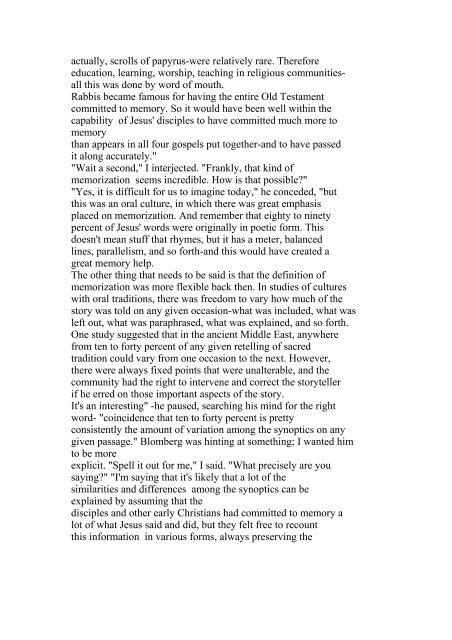The Case For Christ
The Case for Christ records Lee Strobel's attempt to "determine if there's credible evidence that Jesus of Nazareth really is the Son of God." The book consists primarily of interviews between Strobel (a former legal editor at the Chicago Tribune) and biblical scholars such as Bruce Metzger. Each interview is based on a simple question, concerning historical evidence (for example, "Can the Biographies of Jesus Be Trusted?"), scientific evidence, ("Does Archaeology Confirm or Contradict Jesus' Biographies?"), and "psychiatric evidence" ("Was Jesus Crazy When He Claimed to Be the Son of God?"). Together, these interviews compose a case brief defending Jesus' divinity, and urging readers to reach a verdict of their own.
The Case for Christ records Lee Strobel's attempt to "determine if there's credible evidence that Jesus of Nazareth really is the Son of God." The book consists primarily of interviews between Strobel (a former legal editor at the Chicago Tribune) and biblical scholars such as Bruce Metzger. Each interview is based on a simple question, concerning historical evidence (for example, "Can the Biographies of Jesus Be Trusted?"), scientific evidence, ("Does Archaeology Confirm or Contradict Jesus' Biographies?"), and "psychiatric evidence" ("Was Jesus Crazy When He Claimed to Be the Son of God?"). Together, these interviews compose a case brief defending Jesus' divinity, and urging readers to reach a verdict of their own.
Create successful ePaper yourself
Turn your PDF publications into a flip-book with our unique Google optimized e-Paper software.
actually, scrolls of papyrus-were relatively rare. <strong>The</strong>refore<br />
education, learning, worship, teaching in religious communitiesall<br />
this was done by word of mouth.<br />
Rabbis became famous for having the entire Old Testament<br />
committed to memory. So it would have been well within the<br />
capability of Jesus' disciples to have committed much more to<br />
memory<br />
than appears in all four gospels put together-and to have passed<br />
it along accurately."<br />
"Wait a second," I interjected. "Frankly, that kind of<br />
memorization seems incredible. How is that possible?"<br />
"Yes, it is difficult for us to imagine today," he conceded, "but<br />
this was an oral culture, in which there was great emphasis<br />
placed on memorization. And remember that eighty to ninety<br />
percent of Jesus' words were originally in poetic form. This<br />
doesn't mean stuff that rhymes, but it has a meter, balanced<br />
lines, parallelism, and so forth-and this would have created a<br />
great memory help.<br />
<strong>The</strong> other thing that needs to be said is that the definition of<br />
memorization was more flexible back then. In studies of cultures<br />
with oral traditions, there was freedom to vary how much of the<br />
story was told on any given occasion-what was included, what was<br />
left out, what was paraphrased, what was explained, and so forth.<br />
One study suggested that in the ancient Middle East, anywhere<br />
from ten to forty percent of any given retelling of sacred<br />
tradition could vary from one occasion to the next. However,<br />
there were always fixed points that were unalterable, and the<br />
community had the right to intervene and correct the storyteller<br />
if he erred on those important aspects of the story.<br />
It's an interesting" -he paused, searching his mind for the right<br />
word- "coincidence that ten to forty percent is pretty<br />
consistently the amount of variation among the synoptics on any<br />
given passage." Blomberg was hinting at something; I wanted him<br />
to be more<br />
explicit. "Spell it out for me," I said. "What precisely are you<br />
saying?" "I'm saying that it's likely that a lot of the<br />
similarities and differences among the synoptics can be<br />
explained by assuming that the<br />
disciples and other early <strong>Christ</strong>ians had committed to memory a<br />
lot of what Jesus said and did, but they felt free to recount<br />
this information in various forms, always preserving the

















